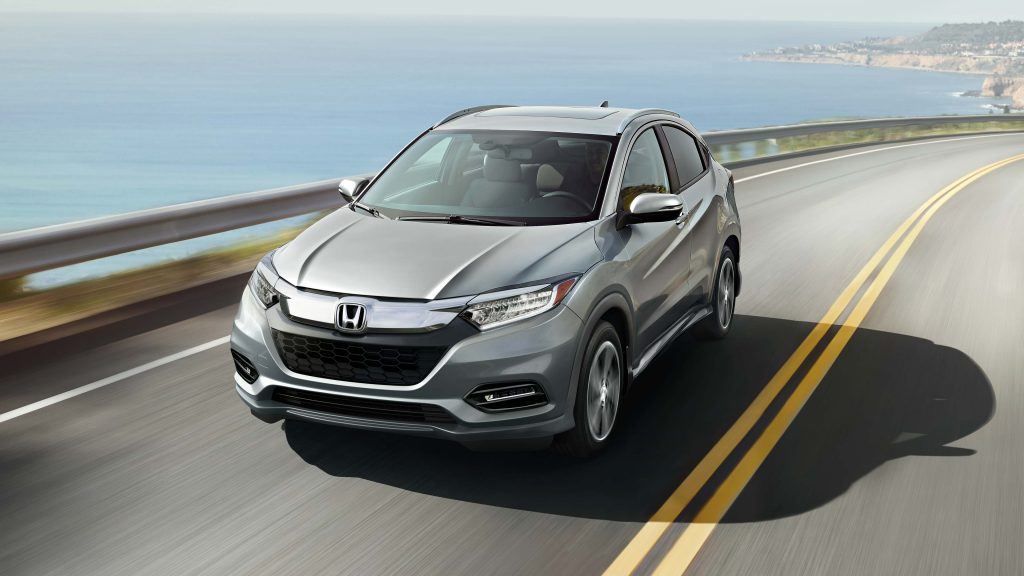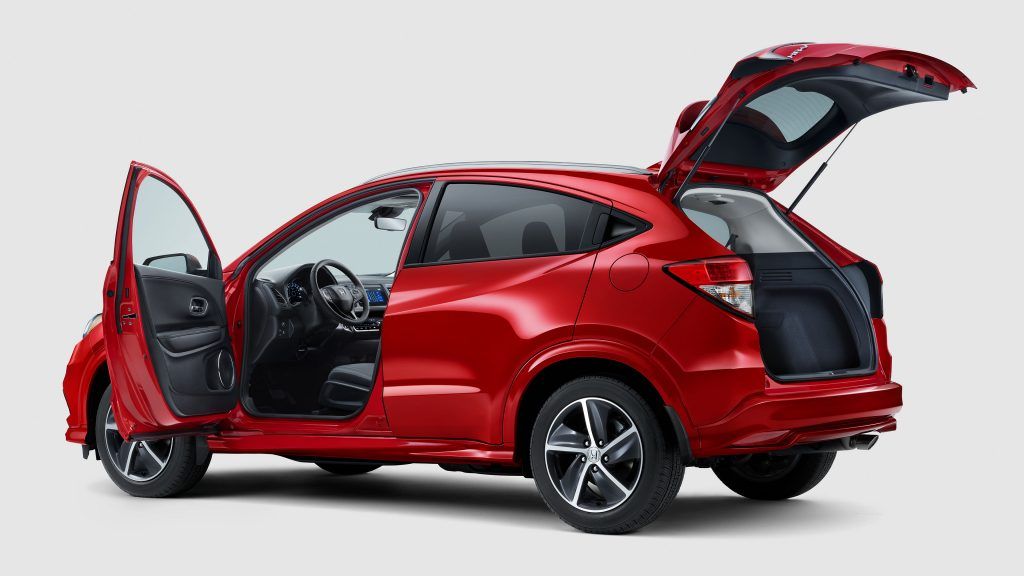2020 Honda Hr-V
July 08 2020, Great Lakes Honda

No adventure too big. No errand too small.
The 2020 HR-V is ready to pack in all the adventure you can handle. Along with a sporty, fun ride, you get the ability to bring it all while you do it all. Inside, it’s full of tech features like the Display Audio System1 with HondaLink™1,2 Next Generation, or the available Honda Satellite-Linked Navigation System™2,3 with bilingual Voice Recognition. There’s also added confidence behind the wheel thanks to Honda Sensing™ Technologies, standard on the 2019 HR-V. With a powerful frame accented by clean lines and robust curves, the 2020 HR-V is a sport utility vehicle, with an emphasis on sport.
For the first time, HR-V now comes with standard Honda Sensing® suite of advanced safety and driver-assistive technologies – including but not limited to Collision Mitigation Braking System™ (CMBS™), Forward Collision Warning (FCW™), Lane Departure Warning(LDW), Road Departure Mitigation (RDM) Adaptive Cruise Control (ACC) and Lane Keeping Assist (LKAS) – on all trims.

EXTERIOR AND INTERIOR
In 2019, HR-V received exterior styling updates to further expand its appeal. The grille is enhanced by a new interpretation of the “flying wing” rendered in dark chrome and extending over the new projector-style headlights. Under the chrome band, the grille opening has been restyled to emphasize a wide look, and the fog light housings have been enlarged to help give HR-V a more aggressive stance. In the rear, new smoked turn signal lenses are connected by a thin chrome band, lending an upscale air to
HR-V’s exterior. Two new colours have been added to HR-V’s palette: Orange Burst Metallic and Platinum White Pearl. Inside, in addition to the new Display Audio system and its easy-to-use interface, the HR-V has an updated interior with new seat fabrics and upper door panels and a revised cupholder.
POWERTRAIN
The 2020 Honda HR-V is powered by a 141 horsepower, 1.8-liter SOHC i-VTEC® 4-cylinder engine. Driving either the front or all four wheels, all HR-V models now use a Continuously Variable Automatic Transmission (CVT). The 6-speed manual transmission has been discontinued.
Utility Mode
You’ll be asking the question, “Will it fit?” a lot less with the HR-V. With the rear seats down, you’ll get up to 1,665 litres of cargo space to lay awkwardly-shaped or tall objects* flat.
Long Mode
People watching you unload the HR-V might just start believing in magic. If you’re loading up material for that DIY project, or just got a deal on a small kayak,* you’re in luck. The front and rear passenger seats fold back to make storing long cargo a little smoother.
Tall Mode
Sometimes, it’s better to stand it up than lay it flat. Flip up the rear seats to create a taller, more forgiving stowage area.** Say yes to awkwardly-sized flat pack furniture boxes or that big cactus that even you won’t be able to kill.
COMPETITIVE ANALYSIS
Honda HR-V vs Toyota C-HR
Drivetrain
- The Honda HR-V has all-wheel drive
Body Exterior
- The Honda HR-V has heated door mirrors
Convenience Features
- The Honda HR-V has tinted windows
Seats and Trim
- The Honda HR-V has driver and passenger heated seats
- The Honda HR-V has rear split-bench seats
- The Honda HR-V has cloth door trim insert
Specs and Dimensions
- The 5.7 ft. turning radius of the Honda HR-V is 0.5 ft. smaller than the Toyota C-HR
- The 657 L interior cargo volume of the Honda HR-V is 119 L greater than the Toyota C-HR
- The 1631 L interior maximum cargo volume of the Honda HR-V is 600 L greater than the Toyota C-HR
- The 2835 L passenger volume of the Honda HR-V is 462 L greater than the Toyota C-HR
- The 998 mm rear legroom of the Honda HR-V is 193 mm greater than the Toyota C-HR
- The 1003 mm front headroom of the Honda HR-V is 35 mm greater than the Toyota C-HR
- The Honda HR-V has a 1349 mm front hiproom
- The Honda HR-V has a 1204 mm rear hiproom
- The 1443 mm front shoulder room of the Honda HR-V is 198 mm greater than the Toyota C-HR
- The 1384 mm rear shoulder room of the Honda HR-V is 50 mm greater than the Toyota C-HR
Honda HR-V vs. Mazda 3
Body Exterior
- The Honda HR-V has heated door mirrors
Convenience Features
- The Honda HR-V has tinted windows
- The cruise control on the Honda HR-V features Adaptive Cruise Control (ACC) automatic distance pacing
Seats and Trim
- The Honda HR-V has driver and passenger heated seats
- The Honda HR-V has rear split-bench seats
Specs and Dimensions
- The 657 L interior cargo volume of the Honda HR-V is 205 L greater than the Mazda CX-3
- The 1631 L interior maximum cargo volume of the Honda HR-V is 103 L greater than the Mazda CX-3
- The Honda HR-V has a 2835 L passenger volume
- The 50 L fuel tank of the Honda HR-V is 5 L larger than the Mazda CX-3
- The 998 mm rear legroom of the Honda HR-V is 110 mm greater than the Mazda CX-3
- The 1003 mm front headroom of the Honda HR-V is 27 mm greater than the Mazda CX-3
- The 973 mm rear headroom of the Honda HR-V is 29 mm greater than the Mazda CX-3
- The 1443 mm front shoulder room of the Honda HR-V is 83 mm greater than the Mazda CX-3
- The 1384 mm rear shoulder room of the Honda HR-V is 103 mm greater than the Mazda CX-3
Honda HR-V vs Nissan Qashqai
Suspension and Handling
- The Honda HR-V has speed-sensitive power steering
Convenience Features
- The Honda HR-V has an air filter
- The Honda HR-V has tinted windows
- The cruise control on the Honda HR-V features Adaptive Cruise Control (ACC) automatic distance pacing
Seats and Trim
- The Honda HR-V has rear split-bench seats
- The Honda HR-V has cloth door trim insert
Safety and Security
- The Honda HR-V has forward collision
Specs and Dimensions
- The 657 L interior cargo volume of the Honda HR-V is 9 L greater than the Nissan Qashqai
- The 2835 L passenger volume of the Honda HR-V is 117 L greater than the Nissan Qashqai
- The 998 mm rear legroom of the Honda HR-V is 150 mm greater than the Nissan Qashqai
AWARDS
- HR-V – 2017 Best Resale Value: Subcompact SUV/Crossover*









